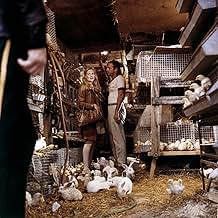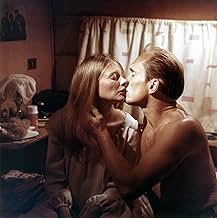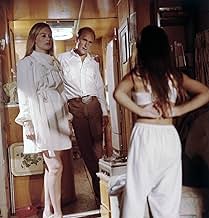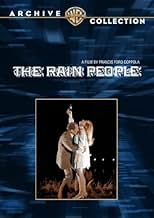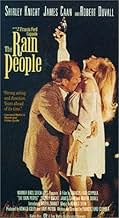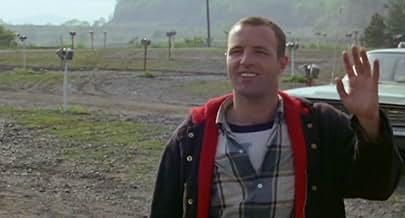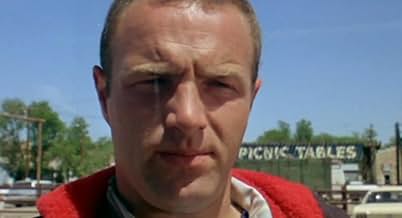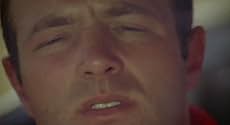CALIFICACIÓN DE IMDb
6.8/10
4.3 k
TU CALIFICACIÓN
Una mujer embarazada se da a la fuga para obtener un poco de libertad y reevaluar sus elecciones vitales.Una mujer embarazada se da a la fuga para obtener un poco de libertad y reevaluar sus elecciones vitales.Una mujer embarazada se da a la fuga para obtener un poco de libertad y reevaluar sus elecciones vitales.
- Premios
- 1 premio ganado en total
Laura Crews
- Ellen
- (as Laurie Crews)
Garrett Cassell
- Farmer
- (sin créditos)
Eleanor Coppola
- Gordon's Wife
- (sin créditos)
- Dirección
- Guionista
- Todo el elenco y el equipo
- Producción, taquilla y más en IMDbPro
Argumento
¿Sabías que…?
- TriviaThe parade scene was filmed in Chattanooga, Tennessee on Veterans' Day. The students in the band were not aware of what was happening. In fact, reading the lips of a majorette, she can be seen asking, "Who was that guy?" as James Caan was weaving through the parade.
- ErroresWhen Natalie first leaves her husband, she drives into a tunnel and emerges from on the west side of Manhattan. That is, she has driven east through the Lincoln Tunnel, presumably heading east. But immediately after, she stops at a phone booth to call her husband, saying she is in Pennsylvania, which is in the opposite direction. Had the intention to suggest a westward journey, she could have driven west through the tunnel to emerge in New Jersey.
- Citas
Jimmy Kilgannon: You hurt me!
- ConexionesEdited into Filmmaker (1968)
Opinión destacada
In some scenes in the Rain People, Francis Ford Coppola's precursor to his hey-day of the seventies, there is the mark of a similar situation to 1969's Easy Rider, but not exactly in the same reference frame. Here we have a drama about disconnected people from society, in some ways alienated by the choices or by limits imposed by one mean or another. It's one of those rare original dramas where some scenes stand alone as total knockouts.
Even with such a low-string budget and a very freewheeling, so to speak, attitude about filming the movie, Coppola is able to capture everything that needs to be said through these clearly defined characters and the curved, unexpected degrees of one character versus the helplessness of another, or vice versa, or both. And, as one might be inclined seeing as how it is very much about the cutaways of suburban life of the 1960s, it has that escapism of the film mentioned before, but of a more concrete, near timeless quality with the drama and the underlying issues. In a way, if Bergman were on route as a quasi-guerrilla 20-something filmmaker out to get the strange truths of everyday outsiders, this might be it.
But along with all of the very direct and sometimes self-conscious photography (though also with a more documentary approach at times, akin with its indeterminable characters), the actors all fit into place. Shirley Knight, an actress I'm not too familiar with, has a complex, diverging role as a pregnant wife running off in a sort of existentialist conundrum of what life is there to have. There are moments of some awe-inspiring acting by her, and one of my favorites (if not my favorite) is when she is on the telephone calling her husband the first time. Such a tense scene on both ends, and in every small gesture and inflection of a word so much about her is spoken with so little.
It's extraordinary in ways that mirror others in Coppola's films. Then comes in the character of 'killer' played by James Caan. This, too, is a dangerous character to take on, as it is a mix of childish bewilderment and amusement with scarred memories. Think Forrest Gump if he didn't make it past the football and wit. It's one of his best, actually, by being the most minimalist- for a guy who's usually playing tough guys in movies, here's one that also is part of the crux of the story and of Knight's character. Also very good in a supporting role is Robert Duvall as a cop with a rough side and rather checkered past; kind of an early sample of other defected characters he would play later on in his career.
So the characters, and what Coppola risks in having an uneasiness running in them, are really what make up the film, as whatever story there is it is definitely not resolved in the usual way you might think or expect. The last ten or so minutes are like others in Coppola's work, where the specific tragedies on all sides are undercut by the emotional- and psychological- implications this will leave on the principles are amplified to the sublime and sad.
This is, for its time, brave on the part of what is trying to be represented (in both the freedom as well as the flaws and ambiguities) in the subject matter. And the style of the picture adds a fragmented kind of view onto it all with quick flashbacks that are graphic and self-contained in a contrast with the longer shots in some crucial scenes. It's a road movie of its period, but its also got a lot more working than it would under another filmmaker with less chances to take on the nature of these outcast characters. One of the best films of 1969.
Even with such a low-string budget and a very freewheeling, so to speak, attitude about filming the movie, Coppola is able to capture everything that needs to be said through these clearly defined characters and the curved, unexpected degrees of one character versus the helplessness of another, or vice versa, or both. And, as one might be inclined seeing as how it is very much about the cutaways of suburban life of the 1960s, it has that escapism of the film mentioned before, but of a more concrete, near timeless quality with the drama and the underlying issues. In a way, if Bergman were on route as a quasi-guerrilla 20-something filmmaker out to get the strange truths of everyday outsiders, this might be it.
But along with all of the very direct and sometimes self-conscious photography (though also with a more documentary approach at times, akin with its indeterminable characters), the actors all fit into place. Shirley Knight, an actress I'm not too familiar with, has a complex, diverging role as a pregnant wife running off in a sort of existentialist conundrum of what life is there to have. There are moments of some awe-inspiring acting by her, and one of my favorites (if not my favorite) is when she is on the telephone calling her husband the first time. Such a tense scene on both ends, and in every small gesture and inflection of a word so much about her is spoken with so little.
It's extraordinary in ways that mirror others in Coppola's films. Then comes in the character of 'killer' played by James Caan. This, too, is a dangerous character to take on, as it is a mix of childish bewilderment and amusement with scarred memories. Think Forrest Gump if he didn't make it past the football and wit. It's one of his best, actually, by being the most minimalist- for a guy who's usually playing tough guys in movies, here's one that also is part of the crux of the story and of Knight's character. Also very good in a supporting role is Robert Duvall as a cop with a rough side and rather checkered past; kind of an early sample of other defected characters he would play later on in his career.
So the characters, and what Coppola risks in having an uneasiness running in them, are really what make up the film, as whatever story there is it is definitely not resolved in the usual way you might think or expect. The last ten or so minutes are like others in Coppola's work, where the specific tragedies on all sides are undercut by the emotional- and psychological- implications this will leave on the principles are amplified to the sublime and sad.
This is, for its time, brave on the part of what is trying to be represented (in both the freedom as well as the flaws and ambiguities) in the subject matter. And the style of the picture adds a fragmented kind of view onto it all with quick flashbacks that are graphic and self-contained in a contrast with the longer shots in some crucial scenes. It's a road movie of its period, but its also got a lot more working than it would under another filmmaker with less chances to take on the nature of these outcast characters. One of the best films of 1969.
- Quinoa1984
- 15 jun 2006
- Enlace permanente
Selecciones populares
Inicia sesión para calificar y agrega a la lista de videos para obtener recomendaciones personalizadas
- How long is The Rain People?Con tecnología de Alexa
Detalles
- Fecha de lanzamiento
- País de origen
- Idioma
- También se conoce como
- The Rain People
- Locaciones de filmación
- Chattanooga, Tennessee, Estados Unidos(Veterans Day parade)
- Productoras
- Ver más créditos de la compañía en IMDbPro
Taquilla
- Presupuesto
- USD 750,000 (estimado)
Contribuir a esta página
Sugiere una edición o agrega el contenido que falta

Principales brechas de datos
By what name was Dos almas en pugna (1969) officially released in India in English?
Responda

